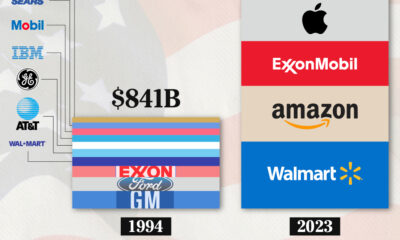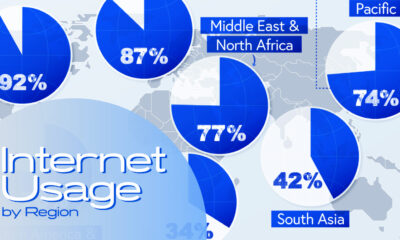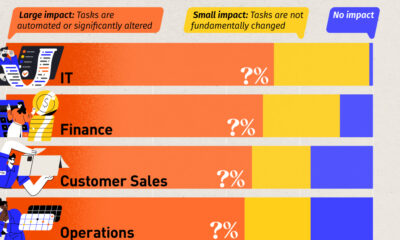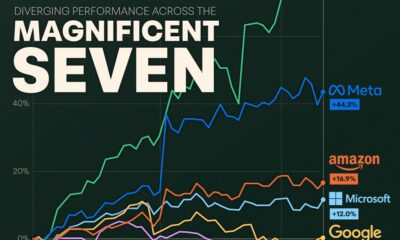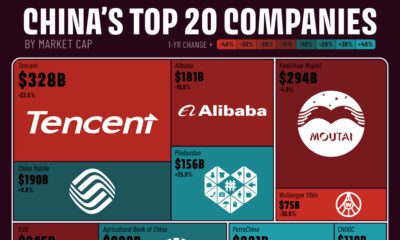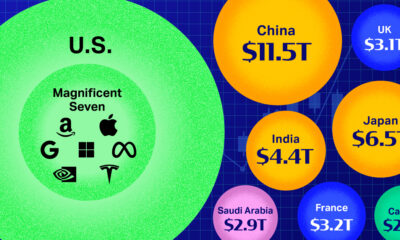Technology
An Introduction to Algorithms
In the modern world, algorithms do much of the digital heavy lifting.
Algorithms control the inner-workings of everything from particle accelerators to stock markets. They determine the news you see, what search results you get, how computers learn, and what gets recommended to you on Netflix or Amazon.
In short, society couldn’t function as-is without algorithms – and as we lean on them to run more things, it becomes more important for us to learn what they are and what they do.
Algorithms 101
Today’s infographic from Futurism digs into the origins of algorithms, and how they impact our everyday lives.

What is an Algorithm?
An algorithm is a predetermined set of steps for a computer to accomplish a task. It’s basically an instruction manual. And as in life, instruction manuals can be simple (e.g. building an Ikea side table) or extremely complex (e.g. filing a patent).
Below is “Sorting Out Sorting” (1981), a timeless primer on sorting methods. It clearly demonstrates the way computers approach sorting vast quantities of information by following a set of instructions.
A famous example of an algorithm is Google’s PageRank, which determines the order in which websites appear in Google’s search rankings. PageRank’s methodology is explained succinctly and effectively in the video below.
By building on a stochastic model called the Markov chain, PageRank revolutionized the way the world accesses information. The power of this algorithm is partially responsible for Google’s ability to control 41% of the online ad market, which is where Alphabet still generates the majority of its revenue.
How Algorithms Influence Society
Social platforms play a substantial role in delivering news and information to us. In fact, an estimated 44% of the U.S. population consumes news via Facebook. The more we rely on social networks to supply us with news, the more algorithms will influence what information we’re exposed to. Since social platforms are designed to serve us customized content, there is a growing concern that we are creating online echo chambers that crowd out opposing views.
Algorithms also have a profound influence on our economy. Roughly 50% of the market moves through high frequency trading – the process of using dedicated programs to make automated trading decisions to place orders. Large portions of our economy are now managed with very little human intervention.
In recent years, progress in the field of artificial intelligence has generated an abundance of interest and excitement. Deep learning (a technique for implementing machine learning) is making all kinds of machine-assisted tasks possible. Preventive healthcare, driverless vehicles, drug discovery, bioinformatics, and hyper-customized recommendations on shopping websites are all here today or coming down the pipeline.
Deep Learning
The remarkable thing about deep learning is that it goes beyond what any human can program a computer to do. Programmers have instead used a learning algorithm – fueled by terabytes of data – to train it to perform complex tasks. The computer essentially figures out for itself how to recognize the desired objects, text, or actions.
Breakthroughs like this are the reason AI startups are now receiving billions of dollars of funding.
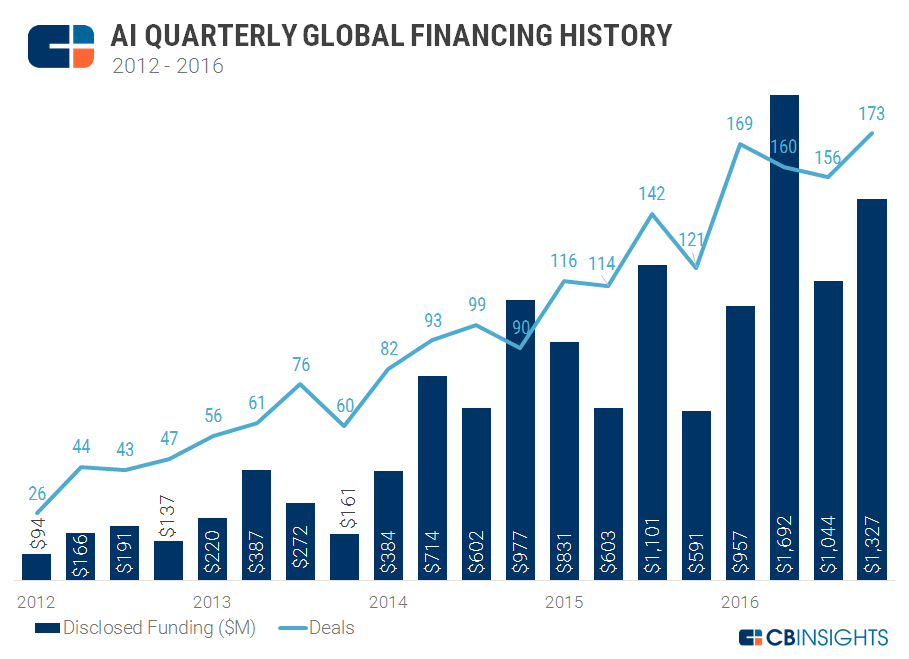
The Algorithmic Economy
The potential upside for technology providers are enormous, particularly if proprietary processes work on a global scale. An era where “things” will communicate autonomously and take actions without human intervention is sure to profoundly impact our society.
The big question is, what will we do once computers and algorithms are taking care of business?
Technology
Ranked: Semiconductor Companies by Industry Revenue Share
Nvidia is coming for Intel’s crown. Samsung is losing ground. AI is transforming the space. We break down revenue for semiconductor companies.
Semiconductor Companies by Industry Revenue Share
This was originally posted on our Voronoi app. Download the app for free on Apple or Android and discover incredible data-driven charts from a variety of trusted sources.
Did you know that some computer chips are now retailing for the price of a new BMW?
As computers invade nearly every sphere of life, so too have the chips that power them, raising the revenues of the businesses dedicated to designing them.
But how did various chipmakers measure against each other last year?
We rank the biggest semiconductor companies by their percentage share of the industry’s revenues in 2023, using data from Omdia research.
Which Chip Company Made the Most Money in 2023?
Market leader and industry-defining veteran Intel still holds the crown for the most revenue in the sector, crossing $50 billion in 2023, or 10% of the broader industry’s topline.
All is not well at Intel, however, with the company’s stock price down over 20% year-to-date after it revealed billion-dollar losses in its foundry business.
| Rank | Company | 2023 Revenue | % of Industry Revenue |
|---|---|---|---|
| 1 | Intel | $51B | 9.4% |
| 2 | NVIDIA | $49B | 9.0% |
| 3 | Samsung Electronics | $44B | 8.1% |
| 4 | Qualcomm | $31B | 5.7% |
| 5 | Broadcom | $28B | 5.2% |
| 6 | SK Hynix | $24B | 4.4% |
| 7 | AMD | $22B | 4.1% |
| 8 | Apple | $19B | 3.4% |
| 9 | Infineon Tech | $17B | 3.2% |
| 10 | STMicroelectronics | $17B | 3.2% |
| 11 | Texas Instruments | $17B | 3.1% |
| 12 | Micron Technology | $16B | 2.9% |
| 13 | MediaTek | $14B | 2.6% |
| 14 | NXP | $13B | 2.4% |
| 15 | Analog Devices | $12B | 2.2% |
| 16 | Renesas Electronics Corporation | $11B | 1.9% |
| 17 | Sony Semiconductor Solutions Corporation | $10B | 1.9% |
| 18 | Microchip Technology | $8B | 1.5% |
| 19 | Onsemi | $8B | 1.4% |
| 20 | KIOXIA Corporation | $7B | 1.3% |
| N/A | Others | $126B | 23.2% |
| N/A | Total | $545B | 100% |
Note: Figures are rounded. Totals and percentages may not sum to 100.
Meanwhile, Nvidia is very close to overtaking Intel, after declaring $49 billion of topline revenue for 2023. This is more than double its 2022 revenue ($21 billion), increasing its share of industry revenues to 9%.
Nvidia’s meteoric rise has gotten a huge thumbs-up from investors. It became a trillion dollar stock last year, and broke the single-day gain record for market capitalization this year.
Other chipmakers haven’t been as successful. Out of the top 20 semiconductor companies by revenue, 12 did not match their 2022 revenues, including big names like Intel, Samsung, and AMD.
The Many Different Types of Chipmakers
All of these companies may belong to the same industry, but they don’t focus on the same niche.
According to Investopedia, there are four major types of chips, depending on their functionality: microprocessors, memory chips, standard chips, and complex systems on a chip.
Nvidia’s core business was once GPUs for computers (graphics processing units), but in recent years this has drastically shifted towards microprocessors for analytics and AI.
These specialized chips seem to be where the majority of growth is occurring within the sector. For example, companies that are largely in the memory segment—Samsung, SK Hynix, and Micron Technology—saw peak revenues in the mid-2010s.
-
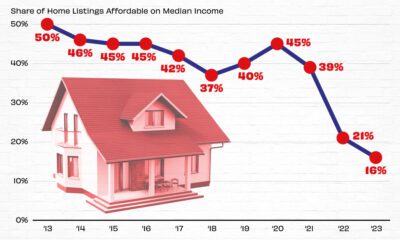
 Real Estate2 weeks ago
Real Estate2 weeks agoVisualizing America’s Shortage of Affordable Homes
-

 Technology1 week ago
Technology1 week agoRanked: Semiconductor Companies by Industry Revenue Share
-

 Money2 weeks ago
Money2 weeks agoWhich States Have the Highest Minimum Wage in America?
-

 Real Estate2 weeks ago
Real Estate2 weeks agoRanked: The Most Valuable Housing Markets in America
-

 Business2 weeks ago
Business2 weeks agoCharted: Big Four Market Share by S&P 500 Audits
-
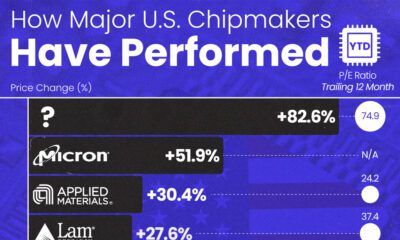
 AI2 weeks ago
AI2 weeks agoThe Stock Performance of U.S. Chipmakers So Far in 2024
-

 Misc2 weeks ago
Misc2 weeks agoAlmost Every EV Stock is Down After Q1 2024
-

 Money2 weeks ago
Money2 weeks agoWhere Does One U.S. Tax Dollar Go?


